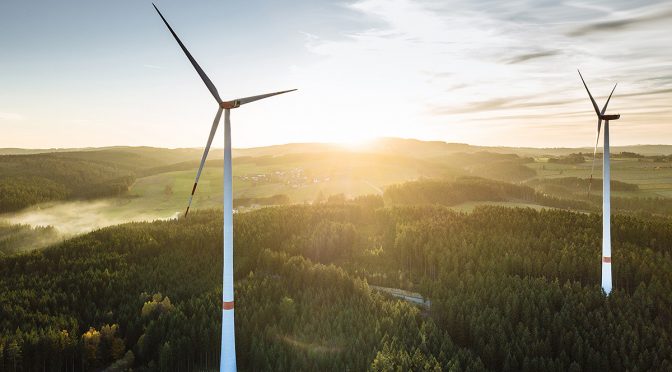In her State of the Union speech in September 2023 EU Commission President Ursula von der Leyen highlighted the current challenges faced by Europe’s wind energy industry. She committed to ensure the future of wind energy was ‘made in Europe’ – and promised a new package to support the wind industry. Today the Commission unveiled its Wind Power Package. It outlines a series of actions that can be taken quickly to strengthen Europe’s wind energy industry. Some of the actions are for the EU, some for the Member States and some for the industry. Together these actions will be a game-changer for Europe’s wind industry and for Europe’s ability to meet its climate and energy goals.
Today the European Commission launched its Wind Power Package, aiming to accelerate the build-out of wind energy in Europe and to strengthen the competitiveness of European wind energy manufacturing.
Europe’s energy strategy REPowerEU wants 420 GW of wind energy by 2030, up from 205 GW today. To deliver that Europe needs to strengthen and expand its wind supply chain.
The wind supply chain is struggling right now. Its input costs have gone up sharply over the last 2 years. Persistent permitting bottlenecks haven’t helped. And poor auction design in many countries has undermined the revenues of both wind farm developers and turbine manufacturers. The manufacturers and their suppliers need to ramp up production and build new factories. But they need financial and other policy support to do so.
At the same time Chinese wind turbine manufacturers are now starting to win orders in Europe. They offer cheaper turbines and “deferred payment” terms, unfairly subsidised by the Chinese State.
Wind Power Action Plan to strengthen Europe’s wind energy industry
The Package proposes a Wind Power Action Plan which sets out 15 actions to strengthen Europe’s wind energy industry.
Auction design is a key focus. The Commission proposes a set of pre-qualification criteria for projects. These criteria decide whether a project can bid into a wind energy auction. They cover data and cybersecurity, environmental protection, and the ability to deliver.
The Commission also stresses the critical importance of Member States indexing their auction prices and tariffs. Inadequate indexation is a big problem right now. Wind farms developers win an auction with a given price, then when they come to order their turbines a year later the costs have gone up and the auction price doesn’t work.
The Action Plan then sets out a series of measure to help finance investments in new factories, infrastructure and the wind energy workforce. It proposes to double the money available for clean tech manufacturing under the next call of the EU Innovation Fund to €1.4 bn.
The European Investment Bank (EIB) will also play a key role. They’ll provide de-risking tools and counter-guarantees by the end of 2023 to cover the exposure of private banks when they lend money to the wind industry. The EIB has also changed its lending policy to finance manufacturing in addition to its extensive financing of wind farms.
The Action Plan also calls for improved visibility on wind energy deployment. National auction plans will now be published on an EU digital platform. And as part of their revised 2030 National Energy & Climate Plans EU Member States will have to outline 10-year plans for wind energy deployment, including a 2040 outlook.
The Commission will also make full use of the trade instruments at its disposal to ensure a level-playing with non-European competitors. The Commission will closely monitor possible unfair trade practices like the subsidisation of wind-related products imported into the EU and stands ready to activate the relevant policy instruments e.g. the EU Foreign Subsidies Regulation.
The Action Plan also seeks to further accelerate the permitting of new wind farms. The Commission will launch a dedicated tool by end 2023 to help Member States digitalise their permitting processes. The European wind industry is already developing an online digital permitting tool, EasyPermits, which is now being piloted by local permitting authorities in Denmark and Poland. It allows permitting staff to process 3 times as many projects as before. And it improves information sharing and accountability with local communities and developers.
So, what happens next? The Wind Power Package sets out actions for the EU Commission, the EIB, the EU Member States and for the wind industry. All will need to play their part. And the actions are to be taken asap. There’s no waiting around for new EU legislation. The Commission propose to enshrine support for the Package in a dedicated Wind Energy Charter to be signed by the end of the year.
WindEurope CEO Giles Dickson says “The Wind Power Package is a game-changer for Europe’s wind energy industry. The new actions on finance, auctions and permitting will speed up the development of wind farms. And crucially they’ll help Europe’s wind energy supply chain deliver the equipment for that. This is good for jobs and growth – and for Europe’s energy security. As Ursula von der Leyen said in her recent State of the Union speech, the future of Europe’s clean tech must be made in Europe.”
Read all actions in the original text of the Wind Power Package.
Read the EU Commission’s press release here.


